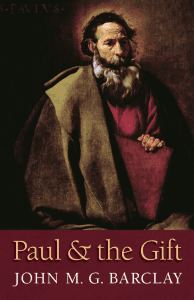 A rock-solid agreement on which Christians of all stripes — and I mean all stripes — should agree is that God is gracious and that the whole of our redemption comes from God’s grace. So, humans don’t save themselves, they don’t become loving or holy by themselves, and they don’t stand up from the grave by themselves. They can no more rise from the dead by themselves than be born again by themselves. So, we can all agree that it is all of grace.
A rock-solid agreement on which Christians of all stripes — and I mean all stripes — should agree is that God is gracious and that the whole of our redemption comes from God’s grace. So, humans don’t save themselves, they don’t become loving or holy by themselves, and they don’t stand up from the grave by themselves. They can no more rise from the dead by themselves than be born again by themselves. So, we can all agree that it is all of grace.
Yet, we differ. Over grace. In ways that get the bristles raised among some. John Calvin, whose viewpoint was “not within the historic mainstream” and whose view was more in line with Augustine, and John Wesley, whose viewpoint was the historic Christian mainstream and who was “Semi-Augustinian” [not semi-Pelagian], differed in some dramatic way — though they stood together on firm ground that it was all of grace. All of this is sketched well in Don Thorsen, Calvin vs. Wesley: Bringing Belief in Line with Practice.
My questions today: What picture of God emerges from Calvin’s view of grace? What picture of God emerges from Wesley’s view of grace?
Thorsen’s sketch of the two views of grace can be seen in these two ways: for Calvin, grace is effectual. God determines, acts, sustains, and accomplishes salvation and humans are “passive.” For Wesley, grace is prevenient in that God showers grace upon all and that grace is triggered into effectiveness by the gracious granting on God’s part of human freedom (“free grace”). To show what Wesley believes, I quote from Thorsen’s summary:
God is thought to limit voluntarily God’s own power over people, which does not represent a genuine limitation in God’s sovereignty, so that people may act responsibly and not irresistibly. By means of God’s prevenient work of grace, which is universally available through the Holy Spirit in the lives of people, people may genuinely respond without God effectually determining their choices. When people do respond, of course, they they are thought to be genuinely responsible for sin and evil that occurs. Sin and evil do not occur irresistibly, because God’s sovereignty and irresistible grace, but through people’s active rebellion or passive indifference to God (49).
Calvin’s emphasis is on the sovereign determinations of God. One of the important elements of Calvin’s theology is that it is all of grace, to be sure, and furthermore it is all in the determinations of God, to be sure, and God’s grace is irresistible from beginning to end, but the reprobates (damned, unsaved, etc) are responsible for their sin and their final judgment. All of this shows the sovereignty of God and is therefore to God’s (sovereign) glory.
Calvin believed in general grace, which is God’s goodness to all of creation in the normal affairs of life, and a special grace, which is the saving grace of God. Wesley’s net in general grace was a bit wider than Calvin’s though he distinguished general grace from prevenient grace — the grace that offers and makes salvation available to all. General grace will later be called “common grace.” Both also emphasized the “means of grace” (like sacraments, church, preaching, prayer) though their lists do differ on what gets included on the list.
They are both grace-theologians, but they differ substantively when it comes to how that grace of God works.
What view of God does one see?











